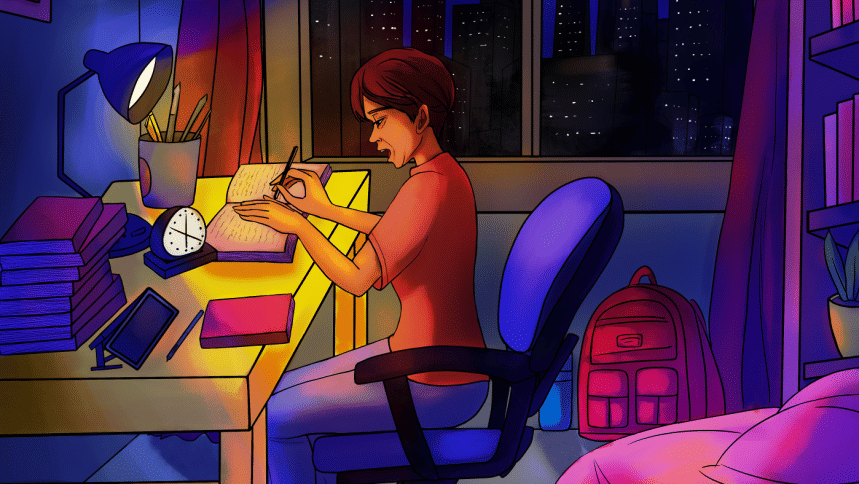Are late night study sessions effective?

As the world drifts into slumber, the quiet symphony of flickering desk lamps and rustling pages accompanies the solitary student studying late into the night. The solitude of the silent hours sets the stage for nocturnal study sessions, where late-night reading and practice tests replace sleep. Students regularly pull all-nighters as a coping mechanism to deal with the horrors of academic pressure. Whether a dedicated night owl or a last-minute crammer, staying up late to study is a staple of the student experience for all.
The appeal of night-time studying often stems from necessity rather than preference. Daytime usually pass in juggling class schedules and extra-curriculars, with most students finding it challenging to allocate sufficient time for self-evaluation. Thus, as burning the midnight oil to catch up on coursework starts looking like a fair exchange, sleep transforms into a luxury that feels almost unattainable. However, do late-night study sessions truly offer the environment conducive to learning and self-evaluation that individuals desire?
For many, studying during the night is their only option. The importance of comfortable, personal study spaces is undeniable; however, many students don't have access to these spaces. For instance, growing up in overcrowded households usually means there is an absence of quiet corners so maintaining focus turns into a constant battle against distractions. For those living in bustling metropolitans, their ability to concentrate is compromised by incessant vehicular noises and chaotic clutter. As a response, many turn to late-night studying as a final resort.
According to research conducted at the University of Notre Dame, people who stay up late perform better in terms of memory retention. This phenomenon is attributed to what experts call 'retroactive interference'. Studying during the daytime leads to interruptions and the continual influx of new information which increases the likelihood of forgetting previously learned material. The brain can understand information more efficiently before sleep, enhancing the ability to recall important details.
Furthermore, people with short attention spans and those who depend on last-minute work for their exams sometimes find themselves performing better during the after-hours. The adrenaline rush of working against a deadline heightens motivation, turning procrastination into a driving force for productivity.
When exam seasons loom, many students rely on cramming overnight to get by. However, studying during odd hours comes with significant health risks, primarily rooted in a lack of sleep disrupting a person's biological clock. Chronic sleep deprivation can lead to long-term health problems. Research shows that consistently staying up late affects the body's circadian rhythms, which regulate sleep-wake cycles, hormone production, and metabolism. Over time, this disruption can increase the risk of cardiovascular disease, obesity, and weakened immune function.
Sleep deprivation also takes a toll on mental health. Missing out on sleep temporarily boosts dopamine levels, constructing a feeling of short-term euphoria. This short-lived high can impair decision-making and lead to impulsive behaviour. For students who constantly rely on studying during the night, these effects may accumulate and lead to a decrease in overall academic performance and well-being.
Despite offering a short-term solution, studying past midnight often leads to diminished productivity throughout the following day. Lack of sleep makes it harder to build focus during classes, retain new information, or participate fully in academic discussions. As a result, students may find themselves trapped in a cycle of exhaustion, where they are constantly catching up but failing to get ahead.
With the fleeting benefits of late-night studying weighed against its lasting toll, the question remains: is it a sustainable practice? The choice narrows down to whether the short bursts of focus at night are worth the long-term consequences. For those who feel trapped by the chaos of daytime, one approach could be shifting study hours to early mornings when thought processes sharpen and the surrounding environment is still calm. Studying in public spaces like libraries or reading cafes can also provide a focused atmosphere without the need to stay up late. Ultimately, the goal is to find a balance supporting both effective learning and overall well-being.
References:
1. Notre Dame News (March 23, 2012). Sleeping after processing new info most effective, new study shows.
2. The Guardian (May 3, 2014). What happens to your body if you study all night?
Titir is trying to catch a few Z's. Find her at [email protected]

 For all latest news, follow The Daily Star's Google News channel.
For all latest news, follow The Daily Star's Google News channel. 









Comments